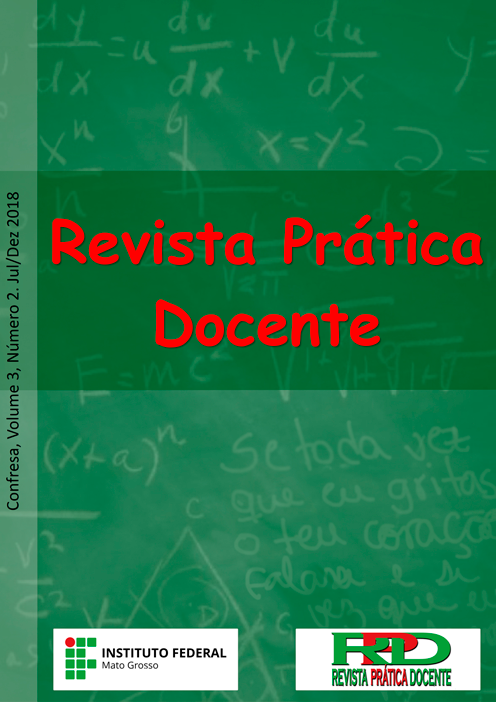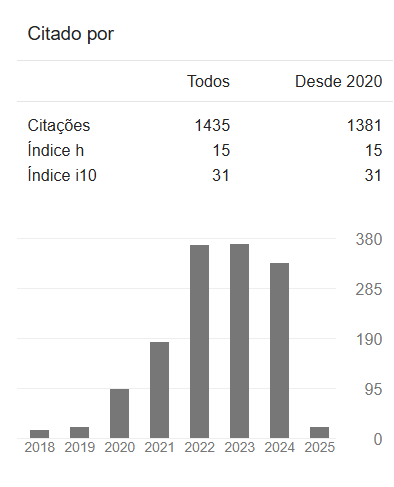MEMORIES WRITING: A REFECTION EXERCISE ABOUT LIFE
DOI:
10.23926/RPD.2526-2149.2018.v3.n2.p445-452.id247Keywords:
Teaching of the Portuguese Language, Memorialist writing, Female Hospitalization UnitAbstract
Writing memories is a way of keeping some of our remembrances alive. In incarceration environments, this search for memories is constant, thus this exercise allows escaping from reality. In this perspective, this research aims to enhance the interest for writing (auto)biographical genres in one Female Hospitalization Unit e, therefore, for literary literature. The theoretical framework is represented by researchers of the autobiographical-memories genre (EIBER et al., 1999; RADVANSKY et al., 2005). The methodology includes a reflection about the imagetic text present in the book, Becos da Memória, by Conceição Evaristo. The data for analysis is constituted by produced memories from the hospitalized teenagers. The research showed as a result the push to the reading and writing practice and reflection about their lifes.
Downloads
Metrics
References
BLAGOV, P. S.; SINGER, J. A. (2004). Four dimensions of selfdefining memories (specificity, meaning, content, and affect) and their relationships to self-restraint, distress, and repressive defensiveness. Journal of personality, 72, 481-512. DOI: https://doi.org/10.1111/j.0022-3506.2004.00270.x
CERVANTES, M. Dom Quixote, 1605. Disponível em: <http://docente.ifrn.edu.br/paulomartins/livros-classicos-de-literatura/dom-quixote-de-la-mancha-de-miguel-de-cervantes.-pdf/view>. Acessado em: 18 jun. 2018.
EIBER, R.; PUEL, M. SCHMITT, L. Heroin abuse, autobiographical memory and depression. Encephale. 1999; 25 (6): 549-57. French.
LIMA-DUARTE, Flávia Karolina; TORRES-FILHO, João Gonçalves; GAIA, Rossana Viana. Eu e meus eus: leitura e escrita de diário em uma Unidade de Internação Feminina. Letras raras. 2017. ISSN 2317-2347. Disponível em: <http://revistas.ufcg.edu.br/ch/index.php/RLR/article/view/859/541>. Acessado em: 28 de jul. 2018.
RADVANSKY, G.; COPELAND, D.; ZWAAN, R. A novel study: investigating the structure of narrative and autobiographical memories. Memory. 2005;13(8):796-814. DOI: https://doi.org/10.1080/09658210444000412
SINGER, J. A.; SALOVEY, P. (1993). The remembered self: Emotion and memory in personality. New York: Free Press.
WESTBURY, C. & DENNETT, D. C. (2000). Mining the past to construct the future: Memory and belief as forms of knowledge. Em D. L. Schacter & E. Scarry (Eds.), Memory, brain, and belief (p.11-32). Cambridge, MA: Harvard University Press.
Downloads
Published
How to Cite
Issue
Section
License
Copyright (c) 2023 A Revista Prática Docente tem o direito de primeira publicação

This work is licensed under a Creative Commons Attribution-NonCommercial 4.0 International License.
Authors who publish in this journal agree to the following terms:
- Authors retain the copyright and grant the journal the right of first publication, with the paper simultaneously licensed under the Licença Creative Commons Attribution allows the sharing of the work with acknowledgment of authorship and initial publication in this journal.
- Authors are authorized to take additional contracts separately, for non-exclusive distribution of the version of the work published in this journal (e.g. publish in institutional repository or as a book chapter), with acknowledgment of authorship and initial publication in this journal.











